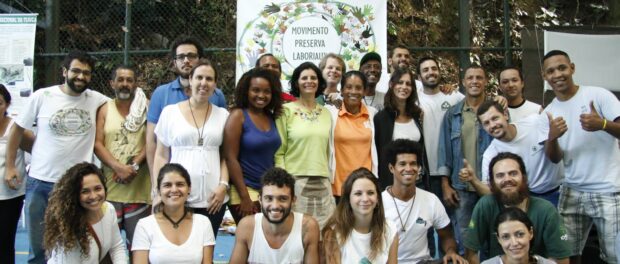
On Sunday August 2, the community-based movement Preserva Laboriaux and its partner, Rio-based non-profit Favela Verde held the first meeting on sustainable community-based tourism in Vila Laboriaux, a small favela community at the top of Rocinha. With around 50 people in attendance, the meeting brought together experts in sustainability, favela tourism, representatives from the Tijuca National Park, and entrepreneurs to discuss and share their experiences in responsible eco-tourism with the residents of Vila Laboriaux. The meeting was the product of an extensive community diagnostic survey conducted in June, revealing that community residents in Vila Laboriaux agreed that responsible tourism and environmental projects are desired and necessary in their community. With the 2016 Summer Olympics just one year away, residents in Vila Laboriaux reflect a trend in South Zone favelas around Rio and are seizing the opportunity to prepare for what they hope will be an influx of favela tourism.

Favela Verde, a non-profit focused on social inclusion and sustainable practices in Rio’s favelas, has recently partnered with the Tijuca National Park as part of the park’s strategic plan to become involved with over 170 favelas bordering the forest. Favela Verde has been working with residents of Vila Laboriaux since 2013 and in June together they conducted a socio-economic assessment based on a survey given to residents. The survey included questions about healthcare, education, security, sanitation, access to resources, and the environment. The result of the survey revealed that the community wanted to work on developing tourism and urban agriculture. The event in Vila Laboriaux served as the pilot for similar meetings to come in forest-bordering favelas.
“Our intention with this event is for it to serve as a tool for community members to be inspired about environmental justice, as well as eco-tourism opportunities. We hope to provide resources and a ‘roadmap’ of sorts,” said Gabriel Neira Voto, co-director of Favela Verde.
Favela Verde brought together a panel of speakers including Cristiano Ferreira, founder of favela tourism network CONTUR, entrepreneur Sheila Souza of Santa Marta‘s Brazilidade, Claudio Poty from the State Tourism Secretariat, and Camila Moraes, Coordinator of the UNIRIO Favela Tourism Observatory. Also in attendance were some living examples of sustainable tourism initiatives, including the Vale Encantado food cooperative, which is located in a favela surrounded by the Tijuca Forest, and which provided locally-sourced food for the event; and Faveliving, an Experience Tourism Agency that promotes tourism in the favelas, and which informed residents about prospects of generating income from tourism with trails and hosting.
Residents gave nods of agreement and energized applause as the speakers emphasized the importance of empowering communities through tourism. “Favela tourism should work to benefit the community directly, to serve as a cultural exchange based on the existing history and culture and to preserve the way of life of favela residents,” Sheila Souza said.
Professor Camila Moraes added: “Favela tourism has the potential to give power back to residents and to facilitate community ownership.”
Residents raised questions to the panel speakers and gathered in small groups to discuss their specific needs and vision for tourism in the community.
“Favela Verde…focuses on women and teenagers, knowing that this demographic will have the most potential to benefit from environmental education and training programs to become trail guides,” said Amanda Darlington, an American social enterprise consultant working with Favela Verde.
“This is the first event I have been to about socially inclusive tourism in the favelas,” said Diogo Barbasa, a 24-year-old resident of Vila Laboriaux. He confirms the community’s shared interest and curiosity in tourism, as well as the potential in the coming year as residents prepare for the Olympics. Marcelo Mendes, a middle-aged resident, shared that these events are powerful and necessary, but that actions and tangible results are critical.

Sunday’s event concluded with the formation of a working group for community-based tourism in Vila Laboriaux. Interested residents will continue to meet and develop a plan for bringing sustainable tourism to their community, as well as exchange resources and knowledge with Favela Verde and the Tijuca National Park. The next meeting is scheduled for August 16 in the new community center in Vila Laboriaux.


